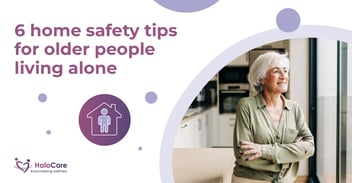
Returning to home after a long-term hospital stay can feel overwhelming for both patients and the Circle of Care. Honouring the wishes of your loved one and empowering them to choose a living situation that’s safe and comfortable is extremely important for dignity and mental wellbeing.
Also, with the Health Service facing a shortage of nearly 1,000 hospital beds, it’s more important than ever to support those who are well enough and wish to return home to do so.
While supporting independent living is vital, it’s important to know life might now look different for your loved ones returning home after a hospital stay, as new technology or support may need to be put in place.
Returning home can be categorised into two events, pre discharge and post hospital discharge.
Predischarge it’s likely that you’ll have a lot of questions and concerns around your loved one's safety. To help alleviate concerns and make the transition as smooth as possible, it’s important to ask any questions you have to your loved one's care team. We’ve created a list of questions below that may be of help.

Post hospital discharge
When a loved one returns home from the hospital, it’s important to ensure they have the right support for a smooth recovery. Some important things to consider post hospital discharge include:
- Home Accessibility: Ensure doorways, hallways, and living spaces are clear of obstacles for easy movement.
- Adequate Lighting: Ensure good lighting in hallways, stairways, and key areas to prevent trips and falls.
- Fall Prevention: Install grab bars in bathrooms, secure rugs, and provide non-slip mats to reduce fall risks.
- Mobility Support: Arrange for walkers, wheelchairs, or other mobility aids if needed.
- Emergency Preparedness: Keep emergency contacts easily accessible and consider a personal alarm system for your loved one.
- Bathroom Safety: Use raised toilet seats, shower chairs, and handrails to improve safety.
Emotional well-being is just as important, so provide reassurance and a comfortable environment. Open communication with healthcare providers can help address any concerns and ensure the best possible care at home.
Staying socially connected can have an impact on both emotional and physical well-being.
Global estimates suggests that 1 in 4 older adults experience social isolation
(World Health Organisation)
A 2025 study by the National Institute on Aging has shown that feeling lonely increases the risk of dementia by 31% (National Institute on Aging)
Research shows that social isolation is strongly linked to heart disease and stroke, with an increased risk of heart disease by 29% and stroke by 32% (Heart.org)
About HaloCare
At HaloCare, we understand that bringing a loved one home from the hospital can be both a relief and a challenge. Our innovative care solutions provide families with peace of mind by offering 24/7 remote monitoring, real-time alerts, and personalised support tailored to individual needs.
From fall detection and medication reminders to mobility assistance and emergency response, our technology ensures a safe and secure home environment. Feel confident that your loved ones are supported in their recovery while maintaining their independence at home.
Additional Resources
- Age Action. How we can help.
- HSE Mental Health
- Age UK. Leaving Hospital










